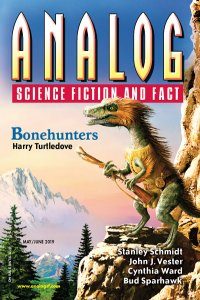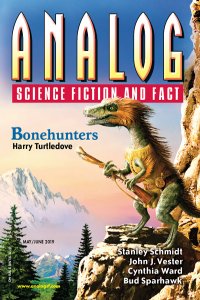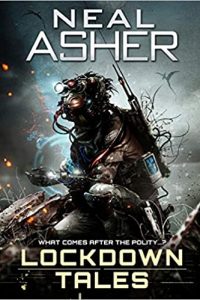Rich Horton Reviews Short Fiction: Analog, Asimov’s, and Space and Time
 Analog 5-6/19
Analog 5-6/19
Asimov’s 5-6/19
Space and Time Spring/Summer ’19
The May-June Analog opens with a fun alternate history from Harry Turtledove, “Bonehunters“, retelling a version of the fossil wars of the late 19th century in a timeline where, apparently, dinosaurs never became extinct, and two separate intelligent species evolved from raptors. The story is told by Rekek, a “greenskin” who serves as a guide. His stepson Junior is a “brownskin” whom he raised from the egg, as they would have it. In this perhaps-a-bit-too-slavishly alternate 19th-century America, the greenskins are taking over the Western part of the continent, with the brownskin natives resisting when they can. As I suggest, the story replicates our historical situation a bit too closely, as it tells of one paleontologist looking for bones and fearing the action of his rival. The story unspools nicely enough, with the relationship of Rekek and Junior serving as its moral center. What I think would make this scenario more interesting would be a close look at how the dynamic of the “greenskins” and “brownskins” as truly different species affected things.
Analog offers a couple of near pure space opera stories, which isn’t the magazine’s usual focus, but I enjoyed these. In Joshua Cole‘s “The Orca Queen“, the pirate of the title encounters a strange cargo ship that turns out to be much more than she is ready to handle, and also turns out to have a very significant bit of news – and an offer – for her, forcing her to examine her personal history. Fun stuff, with a slightly anti-climactic ending. I was also a bit disappointed with the ending of “Leave Your Iron at the Door” by Josh Pearce (and, no, I don’t think you need to be named Joshua to write space opera!), but the rest of the story is gonzo fun enough to make it worthwhile, and it’s not like the ending is a disaster. Minnie Mirv is a sort of Western character, maybe or maybe not on the side of the law, chasing after a sure-enough outlaw named Satyr Meinhoff, who uses his criminal activities to (it seems) finance his Bacchanalia. Soon enough we learn that Minnie Mirv is less concerned with Satyr’s depredations than with the fact that he has her erstwhile lover Vanja. More to the point, she’s bothered that maybe Vanja chose to join Satyr’s maenads voluntarily. That’s the plot, more or less – but what makes it space opera? And gonzo? Well, it’s set in a variety of space habitats, and Minnie Mirv travels these “Badlands” in a high-tech spacesuit/mini-spaceship, traversing singularities, shooting nuclear weapons, etc. The story is full of madcap action, inventive language, and an interesting main character. Pearce has shown abundantly that he’s fascinated with re-imagining SFnal and fantastical tropes via exoticisms of language, technology, and social customs. Cool stuff.
Finally, the prize story here comes from Alec Nevala-Lee. “At the Fall” is told from the POV of Eunice, an AI robotic deep-sea explorer, who has shown a bit more initiative than her fellow robots. A few of them are sent to explore a hydrothermal vent, periodically surfacing to report results and get refreshed. Then their human minders fail to show up. Eunice’s colleagues don’t really know how to respond, but Eunice eventually decides the right answer is to try to return “home.” She makes a long long journey, from whale fall to whale fall and hydrothermal vent to hydrothermal vent – sort of a robot The Incredible Journey – all the while wondering why she can never detect radio signals from humans. We’ve guessed why, of course. The ending is moving and sad.
In Asimov’s for May-June, E. Lily Yu offers “The Doing and Undoing of Jacob E. Mwangi“, set in a near-future Kenya which seems a somewhat positive society that resulted from a general reaction to a time of over-the-top violence. Now there is a version of Universal Basic Income that seems to work, and instead of being a society of Haves and Have Nots, it’s a society of Doers and Don’ts: that is, those who want to contribute more by getting an education and doing work, and those content to live on the dole. Jacob is a Don’t, spending his time gaming with his friends, and his sister is a Doer and is pushing him to make something of himself. You can probably guess the arc of the story already, as one of Jacob’s friends gets a new girlfriend who is, shockingly, a Doer. If the story doesn’t really surprise, it does work its way to an effective resolution, truer to Jacob’s self than to his sister’s plans for him. Ian R. MacLeod returns to his Ten Thousand One Worlds universe with “The Memory Artist“, telling of an old woman, once a fêted artist, who now remembers almost nothing, and her struggle to recall bits of her past, which reveals something much stranger than we expect. Lovely, as ever from MacLeod. Carrie Vaughn‘s “Gremlins” begins with a female Russian pilot in WWII encountering a “gremlin” on her plane – a demon of some sort that eats metal (luckily, to her benefit). The story jumps in unexpected directions – forward to the Iraq War then to interstellar space, and it ends up morphing from what seemed a WWII fantasy to a pretty cool far-future SF tale.
All these are good, but my favorite was Jay O’Connell‘s “Not Only Who You Know“, almost a cynical mirror to Yu’s story, as it looks at the near future, where AI has displaced most workers, even those in technical fields, further widening societal inequality. It’s about Rosalind, a Have Not with real talent who is struggling to get by, who enters into a relationship with her rich boss, who turns out to be nicer than we expect – but there’s always a limit, right? Actually, I should let it open where it really opens – with Rosalind in a hotel room with said boss’s severed head. Then we learn what’s going on. Clever work with an honest and sharp point.
Let’s finish with a couple of more obscure venues that don’t quite reach the quality level of the above places, but which deserve a look. The venerable small-press magazine Space and Time is back again, with a new editor, Angela Yuriko Smith. (Gordon Linzner, who founded the magazine over a half-century ago, has a story in this Spring/Summer issue.) I confess being a bit underwhelmed by the fiction this time out, though I did like Evey Brett‘s “Twisted-Up Things“, about Rowan, who is abused by her parents and manipulated by her sister, until she is driven to escape, and in so doing deals with the maliciousness of the fey, as well as her own issues with gender, and indeed with her body image and her perception of family. There are fantastical elements illuminating all these real-word problems, in an effective way.
Recommended Stories
“Not Only Who You Know”, Jay O’Connell (Asimov’s 5-6/19)
“At the Fall”, Alec Nevala-Lee (Analog 5-6/19)
“Leave Your Iron at the Door”, Josh Pearce (Analog 5-6/19)
“The Doing and Undoing of Jacob E. Mwangi”, E. Lily Yu (Asimov’s 5-6/19)
Rich Horton works for a major aerospace company in St. Louis MO. He has published over a dozen anthologies, including the yearly series The Year’s Best Science Fiction and Fantasy from Prime Books, and he is the Reprint Editor for Lightspeed Magazine. He contributes articles and reviews on SF and SF history to numerous publications.
This review and more like it in the June 2019 issue of Locus.
 While you are here, please take a moment to support Locus with a one-time or recurring donation. We rely on reader donations to keep the magazine and site going, and would like to keep the site paywall free, but WE NEED YOUR FINANCIAL SUPPORT to continue quality coverage of the science fiction and fantasy field.
While you are here, please take a moment to support Locus with a one-time or recurring donation. We rely on reader donations to keep the magazine and site going, and would like to keep the site paywall free, but WE NEED YOUR FINANCIAL SUPPORT to continue quality coverage of the science fiction and fantasy field.







